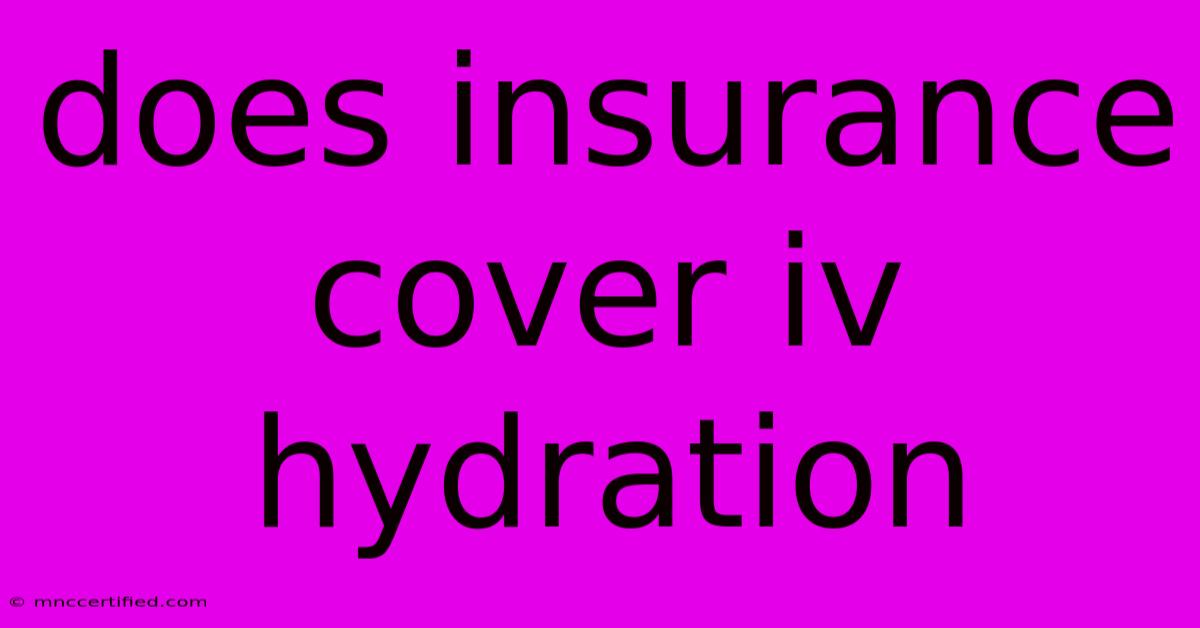Does Insurance Cover Iv Hydration

Table of Contents
Does Insurance Cover IV Hydration? A Comprehensive Guide
IV hydration therapy is gaining popularity as a way to treat dehydration, boost immunity, and even address specific nutrient deficiencies. But a common question arises: Does insurance cover IV hydration? The short answer is: it depends. This comprehensive guide will delve into the complexities of insurance coverage for IV hydration therapy, helping you understand what factors influence reimbursement and how to navigate the process effectively.
Understanding the Variables Affecting Insurance Coverage
Several factors determine whether your insurance company will cover IV hydration therapy. These include:
1. Your Insurance Plan:
- Type of Plan: The type of insurance plan you have (HMO, PPO, etc.) significantly impacts coverage. PPO plans typically offer broader coverage than HMOs.
- Specific Coverage Details: Your policy's specific details, including what's considered "medically necessary," are crucial. Carefully review your policy documents or contact your insurance provider directly. Look for keywords like "infusion therapy," "intravenous therapy," or "dehydration treatment."
- Deductibles and Co-pays: Even if your plan covers IV hydration, you'll likely still have to meet your deductible and pay your co-pay.
2. The Medical Necessity of the Treatment:
This is the most critical factor. Insurance companies generally only cover medically necessary procedures. For IV hydration to be considered medically necessary, your doctor must diagnose a specific condition requiring intravenous hydration. This might include:
- Severe Dehydration: Due to illness, excessive vomiting, diarrhea, or heatstroke.
- Post-Surgical Rehydration: Following a surgical procedure.
- Treatment of Specific Medical Conditions: Certain medical conditions might require IV hydration as part of the treatment plan. Examples might include severe nausea and vomiting, or conditions requiring electrolyte balance maintenance.
IV hydration for preventative wellness or general "boosting" is unlikely to be covered by insurance. Insurance companies typically do not consider these uses as medically necessary.
3. The Provider:
- In-Network vs. Out-of-Network Providers: Using an in-network provider (one your insurance company has a contract with) will usually result in lower out-of-pocket costs. Treatment from an out-of-network provider might not be covered at all or might result in significantly higher costs.
- Provider's Billing Practices: The way your provider codes and bills for the IV hydration therapy will influence whether the insurance company processes the claim. Accurate and detailed billing is critical.
4. The Location of Treatment:
Whether the treatment takes place in a doctor's office, hospital, or an IV hydration clinic will also affect insurance coverage. Hospital and doctor's office treatments are more likely to be covered than those received at standalone IV hydration clinics.
How to Maximize Your Chances of Coverage:
- Obtain a Doctor's Referral: Getting a referral from your primary care physician or a specialist will significantly strengthen your case for insurance coverage. The referral should clearly state the medical necessity of the IV hydration therapy.
- Choose an In-Network Provider: Always verify your provider's in-network status with your insurance company before scheduling your treatment.
- Pre-Authorization: Some insurance plans require pre-authorization for certain procedures, including IV hydration therapy. Always check with your insurer before your appointment to determine if pre-authorization is needed. Failing to do so could result in denial of your claim.
- Detailed Documentation: Ensure your provider provides detailed documentation of the medical necessity for the IV hydration, including your diagnosis, treatment plan, and the reason intravenous administration is necessary.
- Understand Your Explanation of Benefits (EOB): After treatment, carefully review your EOB to understand what was covered and what your responsibility is. If you have any questions or discrepancies, contact your insurance provider immediately.
What to Do if Your Claim is Denied:
If your claim is denied, don't give up. You have the right to appeal the decision. The appeal process will involve submitting additional documentation supporting the medical necessity of the treatment. Your provider can assist you with this process.
Conclusion:
While insurance coverage for IV hydration therapy isn't guaranteed, understanding the factors that influence coverage, and taking proactive steps to maximize your chances, can significantly reduce your out-of-pocket expenses. Always thoroughly review your insurance policy, communicate clearly with your provider and insurer, and meticulously document everything. Remember, proactive communication is key to navigating the complexities of insurance coverage and ensuring a smoother treatment experience.

Thank you for visiting our website wich cover about Does Insurance Cover Iv Hydration. We hope the information provided has been useful to you. Feel free to contact us if you have any questions or need further assistance. See you next time and dont miss to bookmark.
Featured Posts
-
Car Insurance In Lagrange Georgia
Nov 19, 2024
-
Gmails Dummy Email Addresses Coming Soon
Nov 19, 2024
-
Wagatha Christie Coleen Rooneys Free Story
Nov 19, 2024
-
Free Poland Vs Scotland Live Stream
Nov 19, 2024
-
Insurance For Apartment Buildings
Nov 19, 2024